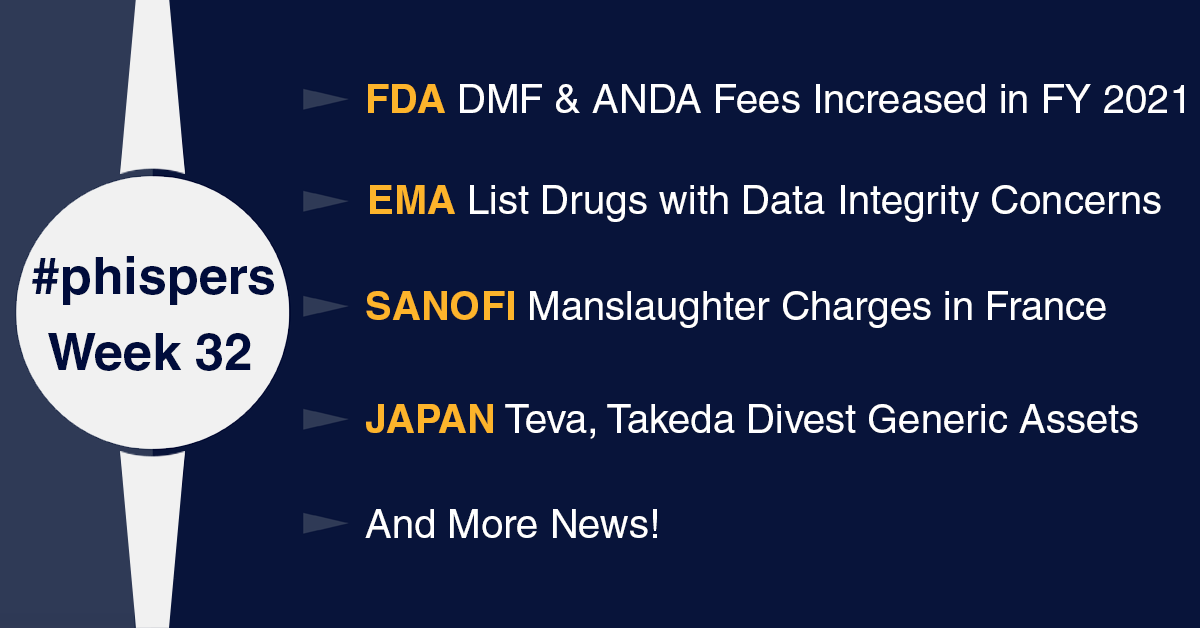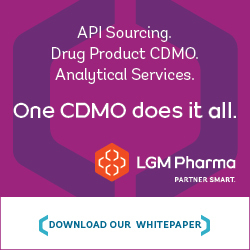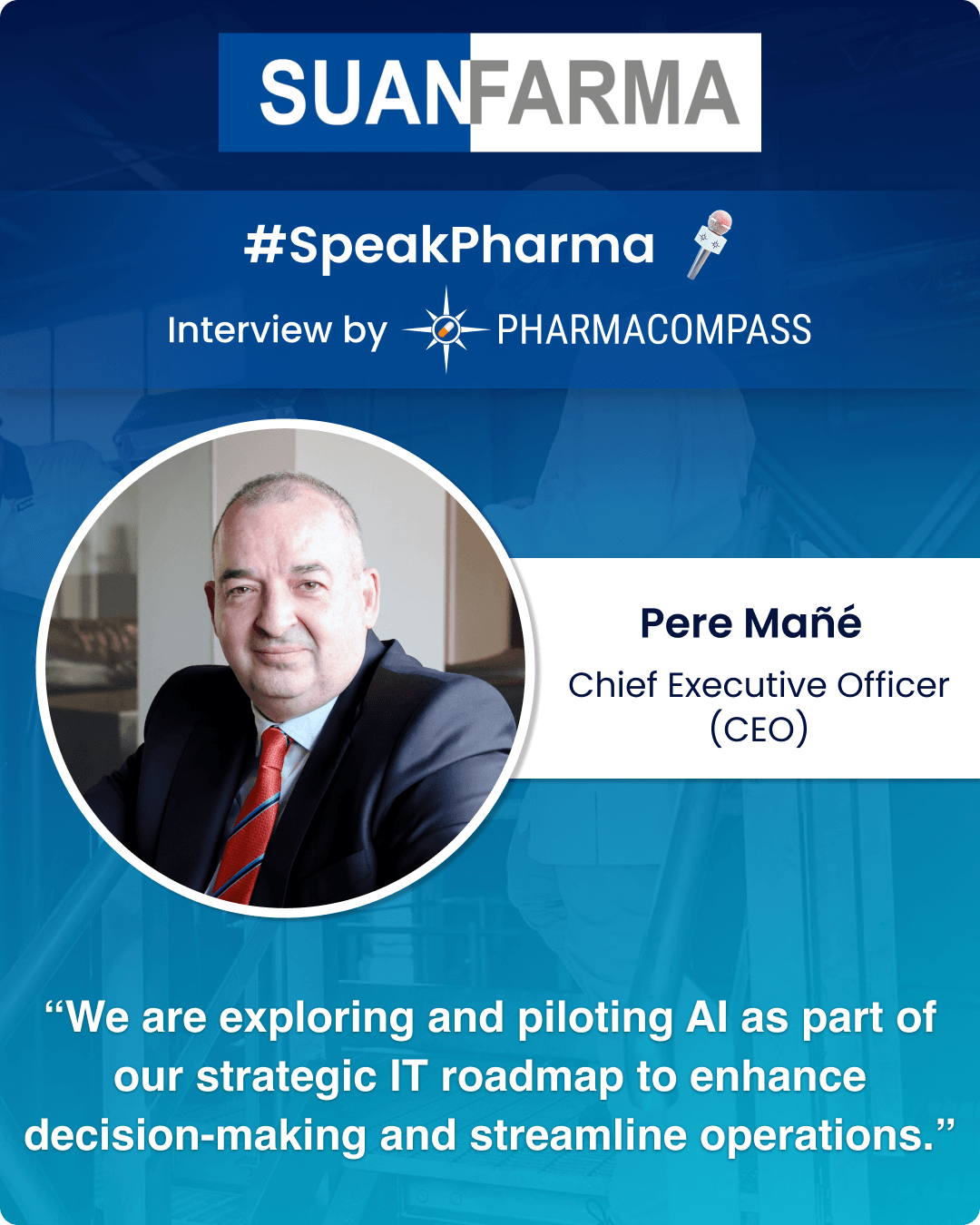
By PharmaCompass
2020-08-06
Impressions: 74655
This week, Phispers brings you the user fee FDA will collect in FY 2021 from drug makers, CMOs and medical device makers.
In France, Sanofi was indicted for manslaughter, over birth defects linked to an epilepsy drug, in a long-running case.
In Covid-19 vaccine updates, there is news that the US government would pay US$ 2.1 billion to Sanofi and GSK for their Covid-19 vaccine to cover 50 million Americans and to underwrite their testing and manufacturing.
Pfizer and BioNTech have agreed to supply 120 million doses of their experimental vaccine to Japan in the first half of 2021.
Teva and Takeda have decided to sell a large chunk of generic assets of their business venture in Japan to Nichi-Iko Pharmaceutical Company.
The US Department of Justice is demanding over US$ 11 billion in criminal and civil penalties from the infamous OxyContin opioid manufacturer — Purdue Pharma — as part of its bankruptcy reorganization plan.
EMA’s human medicines committee has recommended the suspension of the marketing authorizations of generic medicines tested by Panexcell at its site in Mumbai.
FDA publishes new user fees for FY 2021; sharp increase in ANDA and DMF fees
Last week, the US Food and Drug Administration (FDA) published the user fee amounts it will collect in FY 2021 from manufacturers of pharmaceuticals, generic drugs, biosimilars, medical devices and outsourcing facilities. Unlike last year, when the fees were either marginally lowered or kept unchanged, this year the FDA has substantially increased the fee for ANDAs (abbreviated new drug applications) and DMFs (drug master files). However, the agency has substantially reduced the fee under the Prescription Drug User Fee Act (PDUFA VI) for applications, though the PDUFA VI program fee has been hiked by US$ 11,008.
The fee for facilities — APIs, FDFs as well as CMOs — have been reduced. And the fee under the GDUFA program for large and medium-sized generic drug applicants have also been reduced substantially.
| FDA User Fee Table FY 2021 | |||
|
Prescription Drug User Fee Act (PDUFA VI)(in US$) |
FY 2021 |
FY 2020 |
Change |
|
Applications: |
|||
|
Requiring clinical data |
2,875,842 |
2,942,965 |
-67,123 |
|
Not requiring clinical data |
1,437,921 |
1,471,483 |
-33,562 |
|
Program fee |
336,432 |
325,424 |
11,008 |
|
Generic Drug User Fee Amendments (GDUFA II) |
FY 2021 |
FY 2020 |
Change |
|
Applications: |
|||
|
Abbreviated new drug application (ANDA) |
196,868 |
176,237 |
20,631 |
|
Drug master file (DMF) |
69,921 |
57,795 |
12,126 |
|
Facilities: |
|||
|
Active pharmaceutical ingredient (API) – Domestic |
41,671 |
44,400 |
-2,729 |
|
API – Foreign |
56,671 |
59,400 |
-2,729 |
|
Finished dosage form (FDF) – Domestic |
184,022 |
195,662 |
-11,640 |
|
FDF – Foreign |
199,022 |
210,662 |
-11,640 |
|
Contract manufacturing organization (CMO) – Domestic |
61,341 |
65,221 |
-3,880 |
|
CMO – Foreign |
76,341 |
80,221 |
-3,880 |
|
GDUFA program: |
|||
|
Large size operation generic drug applicant |
1,542,993 |
1,661,684 |
-118,691 |
|
Medium size operation generic drug applicant |
617,197 |
664,674 |
-47,477 |
|
Small business operation generic drug applicant |
154,299 |
166,168 |
-11,869 |
EMA shares list of medicines impacted by data integrity concerns at Panexcell
PharmaCompass has routinely covered news about how contract research organizations (CROs) have faced the flak of regulators over the last four to five years. This includes companies like Semler Research Center and Micro Therapeutics Research Labs.
In March this year, the European Medicines Agency (EMA) had started a review of medicines for which studies had been conducted by Indian CRO - Panexcell Clinical Laboratories Private Limited - at its site in Mumbai, India. The EMA had raised clinical data-integrity concerns at Panexcell.
This week, we bring you news that the EMA’s human medicines committee (CHMP) has recommended the suspension of the marketing authorizations of generic medicines tested by Panexcell at its site in Mumbai. The recommendation comes after Austrian and German inspectors found irregularities in how the company carried out bioequivalence studies. These are studies used to show that a generic medicine produces the same amount of active substance in the body as the reference medicine.
“The inspectors found samples from different patients that were exceptionally similar and an instance of personnel documenting the wrong room temperature for the area where samples were being processed. These findings raise serious concerns about the company’s quality management system and the reliability of data from that site,” says an EMA statement.
The CHMP looked at all medicines tested by Panexcell on behalf of EU companies and found none for which adequate data was available from other sources. Therefore, the committee recommended “all medicines authorized in the EU on the basis of bioequivalence studies conducted by Panexcell be suspended from the market.”
Sanofi charged with manslaughter over birth defects linked to its epilepsy drug
In France, prosecutors have indicted pharma giant Sanofi for manslaughter over birth defects linked to its epilepsy drug — valproate, which is marketed as Depakine — in a long-running case.
Studies say valproate had caused disabilities in about 15,000-30,000 children whose mothers took the medicine during their pregnancies. The drug has been on the market since 1967 and is used to treat epilepsy, migraines and bipolar disorder.
Research found that when pregnant women took the drug, their children had an elevated risk — between 10 to 40 percent — of congenital malformations, autism and learning difficulties.
This week, Sanofi confirmed a newspaper report that said prosecutors have now also charged it with manslaughter over the devastating effects of Depakine.
However, the company insisted it had “fulfilled its obligation” of providing information on the drug and its side-effects, and said it “contests the validity of these proceedings.” Sanofi said it has filed a legal challenge to the indictment.
The investigation will determine whether Sanofi can be held responsible for the deaths of four babies in the late 1990s and early 2000s, whose mothers took Depakine while they were pregnant.
Sanofi is also facing charges of aggravated fraud and unintentionally causing injury in 42 cases filed by families. The company says it had warned health authorities of the drug’s risks in the 1980s.
US government demands US$ 13 billion in Purdue Pharma bankruptcy case
The US Department of Justice (DOJ) is demanding that Purdue Pharma, maker of the infamous OxyContin opioid painkiller, pay over US$ 13 billion in criminal and civil penalties as part of its bankruptcy reorganization plan, according to people familiar with the claims.
Purdue had filed for bankruptcy protection nearly a year ago. Due to its Chapter 11 bankruptcy case, the court had halted over 2,600 lawsuits brought by cities, counties, states, hospitals and other plaintiffs alleging the company and its billionaire owners — the Sackler family — were major contributors to the US opioid epidemic. The company and the Sackler family have denied the allegations.
The DOJ had to meet a July 30 deadline to assert financial claims against the company. The federal prosecutors want Purdue to pay as much as US$ 6.2 billion on the criminal side and about US$ 5 billion in civil compensation for tax dollars spent battling the US opioid epidemic and the havoc wreaked by allegedly illegal marketing of the drug, a Bloomberg report said.
The size of the claims represent the upper limit of penalties federal prosecutors might seek, and the ultimate sums paid to resolve the investigations are likely to be far lower. The DOJ is among thousands of creditors vying to extract money from Purdue, which has a liquidation value of only a bit more than US$ 2 billion.
Teva, Takeda to sell chunk of generic assets of Japanese venture to Nichi-Iko Pharma
In April 2016, Japanese drug maker Takeda and Israeli generic giant Teva had announced the establishment of Teva Takeda Yakuhin. This joint venture was to meet the wide-ranging needs of patients for generics in Japan.
Last week, the two drug companies announced that they are shifting focus of this business venture to commercializing a selection of complex generics, specialty assets and other pipeline opportunities.
This shift will include a divestment of the majority of the joint venture company’s generic and operational assets to Nichi-Iko Pharmaceutical. This transaction is expected to close by early 2021.
The strategic shift is the result of an “in-depth review of market opportunities” five years after the joint venture’s launch, Teva said.
The Japanese venture will retain approximately 20 generic molecules and several pipeline assets, as well as its robust portfolio of authorized generics, LLPs and specialty assets.
Teva didn’t specify how much of the venture’s portfolio would be sold off. The downsizing of the joint venture comes months after Teva wrapped up a multiyear restructuring that closed down facilities around the world and cut around 13,000 jobs.
Of late, Takeda has also been shedding assets to hit its goal of cutting annual operating costs and retiring the debt it took on to buy Shire in January 2019.
Vaccine updates: Sanofi, GSK sign deal with US; Japan to buy Pfizer’s vaccine; J&J starts human trials
Last week, the US government announced the biggest award yet under Operation Warp Speed (OWS), the White House initiative aimed at accelerating access to vaccines and treatments to fight Covid-19. In a deal announced by the US Department of Health and Human Services (HHS), the government would pay US$ 2.1 billion to Sanofi SA and GlaxoSmithKline Plc for Covid-19 vaccines to cover 50 million people and to underwrite the drug makers’ testing and manufacturing.
The Sanofi-GSK deal is for 100 million doses and gives the US government the option to purchase another 500 million doses of the vaccine if it proves safe and effective (the value of this deal is not specified). Sanofi and GSK plan to start clinical trials for the vaccine in September.
The cost per person inoculated comes to US$ 42 and is similar to the US$ 40 per patient the US government agreed to pay Pfizer and BioNTech, when it inked an approximately US$ 2 billion deal for 50 million courses of their potential vaccine, a few days prior to this announcement.
GSK said in a statement that more than half of the total funding will go into further development of the vaccine, including clinical trials, with the remainder being used for a manufacturing ramp-up and delivery of doses.
Japan to buy 120 million doses of Pfizer’s vaccine: Pfizer Inc and BioNTech SE said they have agreed to supply Japan 120 million doses of their experimental coronavirus vaccine in the first half of 2021. However, the companies have not disclosed the financial details of the agreement.
BioNTech and Pfizer began a large, late-stage trial of their vaccine candidate to demonstrate its efficacy. The companies say that they are on track to seek regulatory review for the vaccine in October.
After promising data from monkey study, J&J to start human trials: Last week, Johnson & Johnson said it has started human safety trials in the US for its Covid-19 vaccine after a study in monkeys showed that its experimental vaccine candidate offered strong protection in a single dose.
According to a study published in Nature, when exposed to the virus, six out of six monkeys who got the vaccine candidate were completely protected from lung disease and five out of six were protected from infection as measured by the presence of virus in their nasal swabs.
“This gives us confidence that we can test a single-shot vaccine in this epidemic and learn whether it has a protective effect in humans,” Paul Stoffels, J&J’s chief scientific officer, said.
The US government is backing J&J’s vaccine effort with US$ 456 million in funding. The drugmaker said it had started early-stage human trials in the US and Belgium and would test its vaccine candidate in more than 1,000 healthy adults aged 18 to 55 years, as well as adults aged 65 years and older.
CanSino faces trial obstacle: Chinese vaccine company CanSino Biologics Inc is facing a unique challenge in developing its vaccine for the novel coronavirus — it does not know where to conduct late-stage trial in order to stay in the global race to launch a vaccine soon.
Mid-stage trials of CanSino’s experimental vaccine showed that it did not work as well in people with immunity to a particular strain of the common cold virus. It now needs to broaden its pool of testing in Phase 3 trials to see if that outcome, described by the company as “the biggest obstacle”, is replicated abroad.
Most countries are pushing ahead with their own vaccine candidates. Moreover, tensions between China and the US are also posing a challenge for a collaboration to test its vaccine, and CanSino is losing out on time.
The vaccine uses a harmless cold virus known as adenovirus type-5 (Ad5) to carry genetic material from the coronavirus into the body.
“There is a large fraction of people both in the Western world and particularly in the developing world that have the baseline Ad5 neutralizing antibody,” said Dan Barouch, director of the Center for Virology and Vaccine Research at Beth Israel Deaconess Medical Center in Boston.
CanSino’s co-founder said it was in talks with Russia, Brazil, Chile and Saudi Arabia to launch a Phase III trial.
EU warns member states of syringe shortages: After the US took measures to ensure the supply of syringes ahead of the launch of a Covid-19 vaccine, the European Union, last week, warned member states of the risk of shortages of syringes, wipes and protective gear needed for mass vaccinations against Covid-19. The EU also urged its member states to consider joint procurement of these items.
The EU has also asked member states to consider jointly buying more shots against influenza and increasing the number of people vaccinated to reduce the risk of simultaneous flu and Covid-19 outbreaks in autumn.
“Covid-19 vaccines, once developed, may come without syringes and other items,” the EU Commission, the bloc’s executive arm, told health experts from European countries at a meeting last week.
The PharmaCompass Newsletter – Sign Up, Stay Ahead
Feedback, help us to improve. Click here
Image Credit : #Phisper Infographic by SCORR MARKETING & PharmaCompass is licensed under CC BY 2.0
“ The article is based on the information available in public and which the author believes to be true. The author is not disseminating any information, which the author believes or knows, is confidential or in conflict with the privacy of any person. The views expressed or information supplied through this article is mere opinion and observation of the author. The author does not intend to defame, insult or, cause loss or damage to anyone, in any manner, through this article.”







